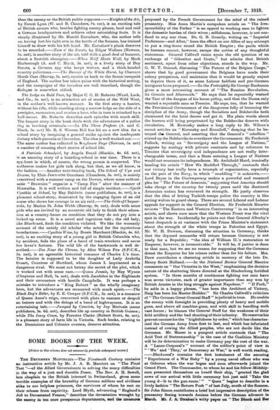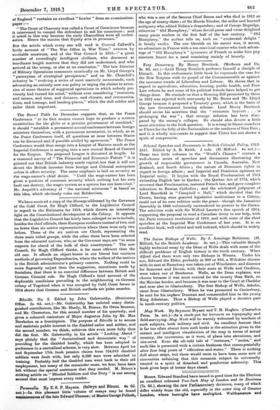SOME BOOKS OF THE WEEK.
[Notice Is this column does not necessarily preclude subsequent review.)
THE DNCEMBES Monienaes.—The Nineteenth Century contains an instructive article by Mr. J. A. R. Marriott on " The Final Test "—of the Allied GovernMents in solving the many difficulties in the way of a just and durable Peace. The Rev. A. H. Sewell, late chaplain to the British interned in Switzerland, gives some terrible examples of the brutality of German soldiers and civilians alike to our helpless prisoners, the survivors of whom he met on their release from captivity. Lord Blyth, advocating " England'S Aid to Devastated France," describes the devastation wrought by the enemy in ten once prosperous departments, end the measures proposed by the French Government for the relief of the ruined peasantry. Miss Anna Martin's outspoken article on " The Irre- sponsibility of the Father " is an appeal to working men to lighten the domestic burden of their wives ; selfishness, however, is not con- fined to any one class. Dr. G. B. Grundy, writing on " Imperial Preference—and After," fears the effect on our Allies of any attempt to put a ring-fence round the British Empire ; the perils which he foresees cannot, however, escape the notice of any thoughtful statesman. General Callwell raises again the old question of an exchange of " Gibraltar and Ceuta," but admits that British sentiment, apart from other objections, stands in the way. Mr. G. W. T. Omond, discussing " The Future of the Belgian Congo," shows that by good government the Belgians have made their colony prosperous, and maintains that it would be grossly unjust to deprive them of it, as some Labour faddists and pro-German intriguers have proposed.—In the Fortnightly Sir George Buchanan gives a most interesting account of " The Russian Revolution, its Genesis and Aftermath." He says that he repeatedly warned the Tsar of the dangers of his home policy, and that the Duma only wanted a reputable man as Premier. He says, too, that he warned the Provisional Government of the dangerous folly of loosening the discipline of the Army, though the Socialists and Bolsheviks both clamoured for the fatal decree and got it. His plain words about the horrors still being perpetrated by the Bolsheviks deserve wide circulation. M. Kerensky makes a long reply to Mr. Wilcox's recent articles on " Kerensky and Korniloff," denying that he be- trayed this General, and asserting that the General's " rebellion " stirred up the Bolsheviks to overthrow the Government. Sir Frederick Pollock, writing on " Sovereignty and the League of Nations," suggests by analogy with private contracts and by reference to Treaties that sovereignty and independence are not really inter- changeable terms, and that a State entering a League of Nations would not renounce its independence. Mr. Archibald Hurd, ironically heading his article " How We Muddled Through," contends that our victory has really been a triumph of organization, especially on the part of the Navy, in which " muddling " is unknown.— Lord Bryce in the Contemporary makes a powerful and reasoned plea for " The Future of Armenia," suggesting that America should take charge of the country for twenty years until the nattered Armenian -nation has recovered its strength. He justly observes that the idea of letting Turkish troops police the country is like setting wolves to guard sheep. There are several Liberal and Labour appeals for support in the General Election. Sir Frederick Maurice reviews " The Eastern and Western Controversy " in an interesting article, and shows once more that the Western Front was the vital spot in the war. Incidentally he points out that General Allenby's latest despatch is at variance-with the Prime Minister's statement about the strength of the white troops in Palestine and Egypt. Mr. W. H. Dawson, discussing the situation in Germany, thinks that the deposed monarchs will return because Germany is not ready for a Republic; "the idea of William IL's restoration as Emperor, however, is inconceivable." It will be, if justice is done to that man, but we see no reason for supposing that the Germans detest the Emperor for his crimes rather than for his failure. Mrs. Drew contributes a charming article in memory of the late Dr. Henry Scott Holland.—In the National Review General Maurice comments on " Our Victories in the West," emphasizing the decisive nature of the shattering blows directed at the Hindenburg fortified system. " In three months of continuous fighting our men have won seven victories, each of greater importance than any won by British Armies in the long struggle against Napoleon." " If Foch," he adds in a happy phrase, " has been the Architect of Victory, Haig has been his Master-Builder." Sir Charles Callwell's criticism of " The German Great General Staff " is judicial in tone. He credits the enemy with foresight in providing plenty of heavy and mobile guns, and above all machine-guns, and with skill in handling such vast forces ; he blames the General Staff for the weakneeS of their field artillery and the bad shooting of their infantry. He reserves his gravest censure for the " frightfulness by order," which has character- ized the German Army from first to last, and which has infuriated instead of cowing the Allied peoples, who are not docile like the Germans. Mr. Maxse in a pungent article contends that " The Acid Test of Statesmanship " in the case of the Coalition Ministry will be its determination to make Germany pay the cost of the war. A " Lance-Corporal's " account of the soldier's point of view in " We ' and They,' or Democracy at War," is well worth reading. —Blackwood's contains the first instalment of the amusing " Experiences of a War Baby " by a young naval officer who was at Osborne when the war began and soon afterwards joined the Grand Fleet. The Commander, to whom he and his fellow-Midship- men presented themselves on board their ship, "greeted the glad news of our arrival with little ceremony but just said Take the young d—ls to the gun-room.' " " Quex " begins to describe in a lively fashion " The Return Push " of last July, south of the Somme. Sir John Simon contributes a brief but impressive description of the peasantry fleeing towards Amiens before the German advance in March. Mr. J. A-.-Strahan'e witty paper on " The Mach and Bar
of England " contains an excellent " howler " from an examination- paper :—
" The Court of Chancery was called a Court of Conscience because it intervened to compel the defendant to soil his conscience ; and it acted in this way because the early Chancellors were all ecclesi- astics. Hence the maxim that Equity acts in personam."
But the article which every one will read is General Callwell's lively account of " The War Office in War Time," overrun by excitable amateurs, and of the War Council in 1915—" a great number of exceedingly intelligent civilians, who discussed at inordinate length matters that they did not understand, and who arrived at the wrong, or else at no conclusion." The late Director of Military Operations comments caustically on Mr. Lloyd George's " paroxysms of- strategical percipience," and on Mr. Churchill's industry in " evolving a series of most masterly memoranda, each advocating an entirely new war policy or urging the claims to atten- tion of some theatre of suggested operations to which nobody pre- viously had turned his mind," without ever considering "resources, and means, and time, and distance, and climate, and communica- tions, and tonnage, and landing-places," which the dull soldier and sailor think important.











































 Previous page
Previous page